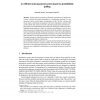Free Online Productivity Tools
i2Speak
i2Symbol
i2OCR
iTex2Img
iWeb2Print
iWeb2Shot
i2Type
iPdf2Split
iPdf2Merge
i2Bopomofo
i2Arabic
i2Style
i2Image
i2PDF
iLatex2Rtf
Sci2ools
129
click to vote
FC
1997
Springer
1997
Springer
An Efficient Micropayment System Based on Probabilistic Polling
Existing software proposals for electronic payments can be divided into "on-line" schemes that require participation of a trusted party (the bank) in every transaction and are secure against overspending, and the "off-line" schemes that do not require a third party and guarantee only that overspending is detected when vendors submit their transaction records to the bank (usually at the end of the day). We propose a new hybrid scheme that combines the advantages of both of the above traditional design strategies. It allows for control of overspending at a cost of only a modest increase in communication compared to the off-line schemes. Our protocol is based on probabilistic polling. During each transaction, with some small probability, the vendor forwards information about this transaction to the bank. This enables the bank to maintain an accurate approximation of a customer's spending. The frequency of polling messages is related to the monetary value of transa...
Related Content
| Added | 25 Aug 2010 |
| Updated | 25 Aug 2010 |
| Type | Conference |
| Year | 1997 |
| Where | FC |
| Authors | Stanislaw Jarecki, Andrew M. Odlyzko |
Comments (0)

